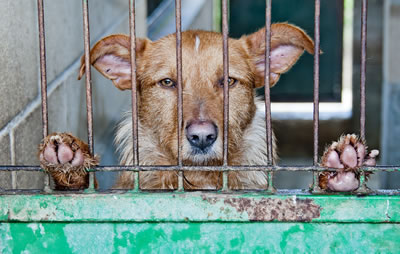Please join me in welcoming a guest blog post by Dayton Uttinger who informs us about the new law being discussed in the New Jersey Legislature. If enacted, it will prevent pet stores from buying animals from “mills”, only from rescue and adoption shelters.
Thank you, Dayton, for your article. – Julie
The Well-Known Secret Behind Pet Stores
By: Dayton Uttinger
 There are few things that excite a household more than bringing home a new puppy. Everyone crowds around the new addition to the family. Some are eager for attention, others withdraw into the arms of whoever’s carrying them, but they are all small and fragile, no matter how large they’re destined to grow later. However, depending on the dog’s origin, dangerous health problems can develop with time, especially if it came from a puppy mill.
There are few things that excite a household more than bringing home a new puppy. Everyone crowds around the new addition to the family. Some are eager for attention, others withdraw into the arms of whoever’s carrying them, but they are all small and fragile, no matter how large they’re destined to grow later. However, depending on the dog’s origin, dangerous health problems can develop with time, especially if it came from a puppy mill.
Puppy mills have long been the bane of animal rights advocates. Although 62% of American households own at least one dog, and we all tend to treat them like family, we don’t always investigate where they’re coming from. We figure that we’ll be giving our pet all the love that they deserve, so really, we’re rescuing an animal from a puppy mill when we buy from a chain store, right?
Unfortunately, this is not the case. It’s tempting to look at each individual animal, but we all need to look at the bigger picture. When we buy an animal that came from a puppy mill, it tells those breeders that the public doesn’t care how the dogs are treated, just as long as they are cute upon arrival. Regardless, people still continue to buy from pet stores or puppy mills directly, although some legislatures have decided to take action. Recently, the New Jersey Senate has passed a bill that would require new pet stores to only sell animals from shelters or rescue organizations. It is not law yet, as it still need to pass the Assembly, but there is definite hope.
However, the measure is not without critics. The President of the Pet Industry Joint Industry Council claims that the bill “comes from a good place” but has significant negative consequences. Obviously, it puts new pet stores at a disadvantage, while well-established chains will only continue the practice. Even if older stores elect to adopt these new standards, there is some debate about whether or not they’ll be able to turn a profit. Ordering from puppy mills is easy and cheap. New puppies arrive a few days later at a reasonable price. In order to cover falling costs, pet stores might have to switch their focus toward products and services, rather than just selling the animals themselves.
But it would only affect newer pet stores, which doesn’t do much to stop that existing pet stores in New Jersey that buy from the worst reported puppy mills. While this would certainly reduce the potential for puppy mills to grow, it doesn’t necessarily halt them all together.
 On the other hand, it is representative of a growing consensus. While previously, these sort of laws were mostly left up to individual city legislatures, New Jersey could join the few others that do have statewide bans. If this trend continues, we could eventually see similar legislation at a national level, perhaps by raising the ridiculously low USDA breeder standards, which permit animals to spend their entire lives in a tiny wire cage. Additionally, putting these regulations on a larger stage could draw attention to the fact that still more is needed.
On the other hand, it is representative of a growing consensus. While previously, these sort of laws were mostly left up to individual city legislatures, New Jersey could join the few others that do have statewide bans. If this trend continues, we could eventually see similar legislation at a national level, perhaps by raising the ridiculously low USDA breeder standards, which permit animals to spend their entire lives in a tiny wire cage. Additionally, putting these regulations on a larger stage could draw attention to the fact that still more is needed.
In the end, these types of laws are more significant on an ideological level than a practical one. They show that we care, but that we lack the will to make significant change. So while we may be providing excellent homes to our own four-legged friends, that is not enough. There are better ways to go about getting a dog. First, you should consider adoption. I know everyone wants a puppy, but older dogs need homes too (plus, you don’t have to potty train them!) But if you can’t find a puppy at a shelter or rescue organization, and you absolutely must have one, do your research! The Humane Society has a great guide to ethically purchasing puppies here.
Of course, the biggest thing you can do to help the cause is to make a big stink about it with your representatives. If they realize that we do care about puppy mills, they’ll certainly put in the effort to make change a reality. These are simple enough changes that have a lot of potential to make some congressmen look the hero. Everyone has a soft spot for animals, especially puppies. We just need to tap into it.
